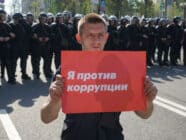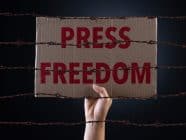Governments in 2012 have attacked journalists, created new laws to kill off new independent digital media, and sparked off a huge diplomatic row over teddy bears, according to the New York-based Committee to Protect Journalists (CPJ) annual report on attacks on the press.
The advocacy group which monitors threats to journalism and journalists around the world, published its annual round up of the state of the world’s media. The organization defines journalists as people who cover news or comment on public affairs in print, in photographs, on radio, on television or online. Its report for 2012 counts the number of journalists killed or imprisoned on 1 December 2012.
According to the data in its report: “Attacks on the Press. Journalism on the Front Lines in 2012,” Syria is now the deadliest place in the world to be a journalist.
At least 28 journalists were killed there last year. Most were local reporters and citizen journalists, but at least four international correspondents also died.Research by the CPJ shows that government forces loyal to President Bashar al-Assad were responsible for many of the fatalities, but some journalists and news outlets have also been reportedly attacked by rebel forces.
Turkey meanwhile is the country that jails the most journalists: at least 49 journalists had been imprisoned by December 1 2012. A harsh penal code, a broadly worded anti-terror law, a criminal procedure code weighted in favour of the state and a general anti-press environment made it easy to jail reporters. Most of the imprisoned journalists were Kurdish, charged with supporting terrorism for reporting on the banned Kurdistan Workers Party. Prime Minister Recep Tayyip Erdogan frequently files defamation lawsuits and orders media owners and editors to reign in their journalists.
Belarus continued to isolate itself internationally with a series of harsh, and sometimes baffling, attacks on the press. At least four reporters were banned from leaving the country in March and another four were jailed last year. Several others have been threatened, harassed, fined and assaulted. A Swedish advertising agency airdropped hundreds of teddy bears pinned with press freedom slogans over the country. One reporter who covered the stunt was jailed. Another two who published photos and stories were fined and interrogated. The foreign minister was fired and the Swedish ambassador expelled in the aftermath. In February, the government expelled Polish and European Union ambassadors after the EU widened travel bans against Belarusian officials over human rights abuses.
The report also highlights that press freedom in Russia has declined in the last year. The climate for the media had improved modestly under Dmitry Medvedev but deteriorated sharply after Vladimir Putin returned to power in May 2012. He signed a series of restrictive bills aimed at stifling dissent and curbing the work of civil society. Medvedev had decriminalised defamation, making it a civil, not a criminal crime. Putin criminalized it again, and raised the maximum fine to 5 million rubles (E115,000), up from a previous 3,000 rubles. He also passed restrictive laws on Internet content, allowing authorities to block sites deemed to have “unlawful content.” The law’s vague definitions of unlawful content include “making war propaganda” and “inciting inter-ethnic hatred.” Journalists worry that the law will be used to silence critical views on the Internet, which has recently become an important base for independent news.
Legislators in the Ukraine also attempted to criminalise defamation. They were forced to withdraw the bill in the face of nationwide protests and an international outcry, but the government has systematically attacked press freedom through censorship, physical attacks on reporters and politicized lawsuits against news outlets. The government launched a tax investigation into the opposition-supporting broadcaster TVi. In July it raided the station’s newsroom and froze its bank accounts. Prosecutors eventually dropped their case against TVi owner Nikolaw Knyazhitskiy but fined the station and issued restrictive new laws on online content.
The Hungarian government implemented a media law that requires “balanced reporting” and fines for transgressions, despite strong opposition from the European Commission.
Azerbaijan hosted two high profile events in 2012: the Eurovision song contest and the Internet Governance Forum, but authorities still attacked dissenting voices. At least nine journalists who criticized the government have been held on a variety of charges including hooliganism, drug possession and extortion: charges most human rights groups including the CPJ say are fabricated. Several independent journalists including the award winning Idrak Abbasov have been assaulted, and investigative journalist Khadija Ismailova was subject to a smear campaign after reporting on the ruling class’s business interests. Parliament responded to her work by passing legislation that gives the president broad immunity from prosecution and bars corporations from disclosing a wide range of financial information.
Kazakhstan’s Nursultan Nazarbayev passed restrictive anti-media laws in early 2012, weeks after violent clashes between police and striking oil workers in the western city of Zhanaozen that disrupted labour relations in December 2011. Reporters who covered the strikes were attacked, harassed, and interrogated. In January 2012, the government passed legislation that barred the distribution of print or electronic news that the authorities deem a threat to national security. The authorities also imposed new regulations that require Internet café managers to block access to blacklisted websites and proxy servers, monitor client activity and share client information with government security services. International broadcasters airing programs in Kazakhstan are also now required to register with the state.
Photo credit: Freedom House DC / Flickr CC
Tags: attacks on press freedom, Azerbaijan, class between police and oil workers, Committee to Protect Journalists, CPJ, CPJ annual report, death of journalists, Eurovision, Freedom House, journalists killed in syria, kazakhstan, Press freedom, press freedom 2012, teddy bears in Belarusia












































